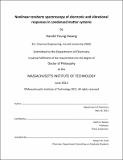Nonlinear terahertz spectroscopy of electronic and vibrational responses in condensed matter systems
Author(s)
Hwang, Harold Young
DownloadFull printable version (7.080Mb)
Alternative title
Nonlinear THz spectroscopy of electronic and vibrational responses in condensed matter systems
Other Contributors
Massachusetts Institute of Technology. Dept. of Chemistry.
Advisor
Keith A. Nelson.
Terms of use
Metadata
Show full item recordAbstract
In this work, I describe experiments utilizing high-field terahertz (THz) pulses to initiate nonlinear responses in several classes of materials. We have developed several methods for interrogating the nonlinear THz response of materials including collinear and noncollinear THz-pump/THz-probe spectroscopy, and THz-pump/optical probe spectroscopies including THz Kerr effect spectroscopy. We have observed nonlinear free-carrier absorption, occurring through the saturation of free-carrier mobility in bulk semiconductors. We have demonstrated that highly energetic electrons in the conduction band can generate electron-hole pairs in indium antimonide, and have elucidated the dynamics of the carrier generation process. We have observed nonlinear conductivity responses in graphene, showing that a strong THz pulse can heat the electron distribution leading to saturable absorption in the THz range. We have demonstrated THz-induced optical anisotropy in simple liquids, allowing for the measurement of subsequent orientational dynamics. We have driven nonlinear vibrational dynamics in ferroelectrics, demonstrating that the strong anharmonicity of lattice vibrational modes can induce an anisotropic optical response. We have begun to study nonlinear vibrational responses in molecular crystals, which is of importance in mode coupling and energy transfer processes in the THz range. Finally, we have driven nonlinear metamaterial responses in gallium arsenide and vanadium dioxide. In GaAs, we have shown that metamaterial properties may be tuned by an intense THz field if the substrate material (GaAs) is changed by the incident THz pulse, and we have demonstrated carrier multiplication locally in the metamaterial split ring resonator gaps where substantial electric field enhancement occurs. In VO2, we have shown that THz radiation can drive an insulator-to-metal phase transition, opening up new possibilities in the control of the states of matter with THz fields. This work has demonstrated only a few of the capabilities made possible by the interaction of intense THz radiation with matter, and provides a general framework to open up new research in a nascent field.
Description
Thesis (Ph. D.)--Massachusetts Institute of Technology, Dept. of Chemistry, 2012. This electronic version was submitted by the student author. The certified thesis is available in the Institute Archives and Special Collections. Cataloged from student-submitted PDF version of thesis. Includes bibliographical references.
Date issued
2012Department
Massachusetts Institute of Technology. Department of ChemistryPublisher
Massachusetts Institute of Technology
Keywords
Chemistry.